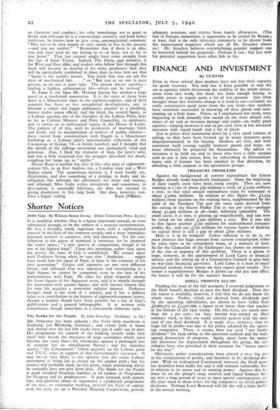Shorter Notices
John Gay. By William Henry Irving. (Duke University Press. $3.50.)
IT is doubtful whethei Gay is a figure important enough, or even substantial enough, to be the subject of a massive reconstruction. He was a friendly, timid, ingenious man, with a sophisticated interest in the lives of the common people, and a more immediate personal interest in courtiers, wits and literature. Yet his con- tribution to the gaiety of mankind is immense, for he invented the comic opera ; "a new species of composition, though it be not of the highest kind." Upon this invention, rather than upon his poetry, the fame of Gay is established. We cannot agree with Professor Irving when he says that "Ambition . . . might have made him the equal of Pope, at least in the estimate of his own generation." Genius and ingenuity are two very different things, and although Gay was ingenious and entertaining in a high degree, he cannot be compared, even in the best of his performances, with Pope. He takes his place elegantly among the lesser figures of the Augustan scene, and it is mainly through his association with greater figures and with literary history that his own life acquires a somewhat indirect interest. Professor Irving's book is the work of a scholar, and it has a definite value as a contribution to the history of eighteenth-century letters, though a student Would have been grateful for a list of Gay's publications and a general bibliography. It is written with competence, though sometimes in a consciously elaborate style.






























 Previous page
Previous page